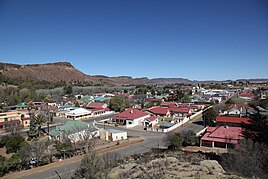Burgersdorp | |
|---|---|
Top: Burgersdorp viewed from The Sentinel blockhouse, Middle left: Dutch Language Monument, Middle Right: NG Church, Bottom left: The Sentinel Blockhouse, Bottom right: A farm near Burgersdorp | |
| Coordinates: 30°59′32″S 26°19′29″E / 30.99222°S 26.32472°E | |
| Country | South Africa |
| Province | Eastern Cape |
| District | Joe Gqabi |
| Municipality | Walter Sisulu |
| Established | 1846[1] |
| Government | |
| • Type | Local Municipality |
| • Mayor | Ncedo Ngoqo (ANC) |
| Area | |
| • Total | 27.9 km2 (10.8 sq mi) |
| Elevation | 1,405 m (4,610 ft) |
| Population (2011)[2] | |
| • Total | 5,241 |
| • Density | 190/km2 (490/sq mi) |
| Racial makeup (2011) | |
| • Black African | 39.6% |
| • Coloured | 31.0% |
| • Indian/Asian | 0.7% |
| • White | 28.7% |
| • Other | 0.0% |
| First languages (2011) | |
| • Afrikaans | 62.9% |
| • Xhosa | 30.0% |
| • English | 2.9% |
| • Sotho | 1.7% |
| • Other | 2.5% |
| Time zone | UTC+2 (SAST) |
| Postal code (street) | 9744 |
| PO box | 9744 |
| Area code | 051 |
Burgersdorp is a medium-sized town in Walter Sisulu in the Joe Gqabi District Municipality of the Eastern Cape province of South Africa.
In 1869 a Theological Seminary was established here by the Gereformeerde Kerk, but in 1905 it was moved to Potchefstroom, acting as an instrument in the formation of the PUK in 1919, then becoming the Potchefstroom University for Christian Higher Education in 1951.
The Afrikaner Bond political party was founded in Burgersdorp in 1881.[3]
- ^ Robson, Linda Gillian (2011). "Annexure A" (PDF). The Royal Engineers and settlement planning in the Cape Colony 1806–1872: Approach, methodology and impact (PhD thesis). University of Pretoria. pp. xlv–lii. hdl:2263/26503.
- ^ a b c d Main Place Burgersdorp from Census 2011.
- ^ Steevens, George Warrington; Blackburn, Vernon (1900). From Capetown to Ladysmith; an unfinished record of the South African war. New York: Dodd, Mead and Company. p. 25. Retrieved 24 November 2009.







